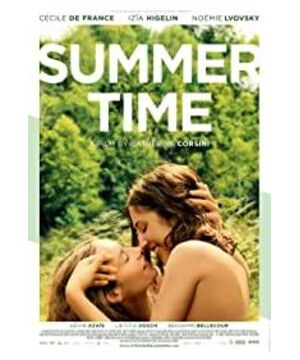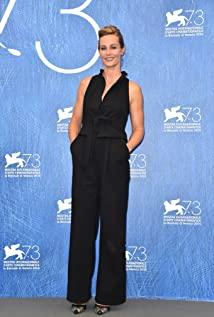"Beautiful Times" (2015) directed by French female director Caterina Corsini, the heroine Delphine, an authentic country girl, is inherently restrained, mixed with a little wildness, Carol She is a Spanish teacher in Paris and a pioneering feminist, but Delphine has taken the initiative in the change of roles in the relationship between the two.
After more than 40 years, it is not easy to re-interpret the real situation of French "homosexuality" at that time. When Carol read Delphine's letter excitedly at the end of the film, Delphine smiled at ease in the south. It can be said that the success of the film is like the final choice of the two heroines.
France in 1970 experienced the "red storm", and various mixed thoughts emerged one after another. Sartre's "existentialism" was at the right time, and Simon de Beauvoir's "Second Sex" not only brought human loneliness And despair, it also brought the aftermath of female liberation. Godard's "New Wave" film not only fired at opponents, but also began to scold Truffaut, who was in the same camp. The only correct, was replaced by the tide of debate. Combining mixed thoughts, after the final melee, it brought a new round of self-awakening and reflection.
At this time, Delphine, who was helping his parents with the family farm in the countryside, came to Paris to work with the pain of love. Wearing red bell-bottoms, she meets and rescues Carol, a feminist who is "robbing" men's wallets on the street. These women who participate in feminist organizations, they come from all walks of life in society, drum and cheer for the freedom and liberation of women every day, and put them into various actions.
Of course, this Carol is not the American Carol, but it has the same quality, independent and self. She already had a cohabiting boyfriend. After she met Delphine, she was attracted to him. Coupled with Delphine's initiative, Carol obediently "came out" with her. In those days, even in an open society like France, "homosexuality" was still considered a form of mental illness. There are gay men who were forcibly sent to the hospital for treatment, but were actually rescued by their group of feminists.
It was after this rescue operation, that night in the southern countryside, that they had a better understanding. Carol initially avoided her feelings for Delphine. Back in Paris, she said to Delphine, please don't get me wrong, I have a lot of gay friends, but I'm not. But the brave Delphine said I wasn't either, took her hand, pushed her to the side of the wall, and kissed her in the street. It really caught her off guard.
It turns out that country girls are so sharp and direct. Indeed, Izia Heiglin, who plays Delphine, is not the kind of actress who is dazzling and bright, but very much in line with the agile appearance of a country girl. The charming flavor, when she smiles, is like a gurgling spring. Compared with the slenderness and subtlety of Ceci De France who plays Carol, it naturally forms a sharp contrast. Women of two classes met in Paris, and they collided with sparks of gender that were not accepted by society. I have to say, it was bold enough at that time.
Although there were large-scale films like "Emmanuel" in France in the 1970s, the topic of "homosexuality" still has social taboos. Especially when Delphine's father was hospitalized with a stroke and she had to go home to tend the farm, only to wake up weeks later. Carol, who is missing more and more, has to take a slow train every weekend to the countryside of Delphine under her boyfriend's incomprehension.
Delphine is a quick and capable girl. She drives a tractor, ploughs the land, dries the hay, and milks the cow. It can be compared with taking a hoe every day. When the mother saw her daughter helping Carol pick picks, it made her feel so intimate. In the past, the parents had always hoped that their daughter would marry Antoine, or at least keep her by their side.
In fact, Antoine, a country boy who grew up since he was a child, has always liked Delphine and silently helped her family do a lot of things. Delphine can only say thank you for everything you did for my family. But Antoine inadvertently saw the two of them making out, and he understood everything. This is both incredible and unforgettable in the remote countryside, but fortunately, the guy has always taken it to heart.
After staying in the country for a long time, there will always be gossip. Besides, in order to protect her farm from being bought by outsiders, Delphine must stay in the country. This is a big test for Carol, and she feels confused and sad. I don't know how to go on. She had to talk to Delphine's father, who was still confused, alone, that I was not here to play, nor to fetch hay, but for your daughter, because I fell in love with her, madly in love with her.
In the face of a stroke person, she can speak her heart out. But the reality made her stagnant and could only walk silently. For this pair of hard-working mandarin ducks, there is nothing worse than being poked by someone. The two were holding hands in the woods, and when they were seen by the men in the village, Delphine was very anxious, saying that the village would soon hear that Morris's daughter was gay. She blamed Carol for thinking the problem was always easy, after all, this wasn't Paris.
At the village meeting, Delphine saw the man, talking and laughing to others, she reluctantly pulled Antoine and kissed him, causing him to lose his temper inexplicably, saying that you want to Am I covering for you, I already know about you, but I love you and I will never say it. It seems that all the pain can only be borne by Delphine, but Carol still doesn't care.
This morning, mother Monica opened the door and found them entangled together. She opened the curtains and said that it was past 7:30, and went out without saying anything. It made Carol happy for a while, she had no idea how much pressure Delphine was under.
Sure enough, Monica didn't blame her daughter. When she went out to do things, she finally got angry with Carol. She issued an eviction order, saying that you could leave in two hours, and scolded Carol for bringing her daughter. You This filthy woman, the devil, was about to slap her, so frightened Carol had to run away. Carol ran to the ground and found Delphine who was driving a tractor. Delphine said you want to go and I will go with you.
The two came to the train station with their suitcases, but Delphine didn't want to go with her, saying I couldn't leave, I couldn't, I couldn't do it. Carol thought she would still get on the train with her, but she never got up. Disappointed Carol can only return to Paris alone. The mother was happy to see her daughter returning, and asked, you missed the train, what about the other one. She is gone and will never come back.
Fast-forward to 1976, and Carol is already working in a women's service agency. While busy, she receives a letter from afar, of course, Delphine. She is very excited. The letter said that she still left home and went to the south of France to rent a small farm and live a free life. Over the years, I miss the time we used to be together, but when you got on the train, I knew we were It's impossible to go back, but we can move on, love you Delphine.
Since it was in the 1970s, it is impossible not to entangle with the traces of the time, to skip or avoid it, which would be taken for granted and too frivolous. It is their unresolved contradictions that give birth to the valuable texture of the film, which is moving and brilliant. Or rather, it's a movie that pays homage to the 1970s.
The city is full of simple impulses, and the beautiful countryside is full of vitality. Under the reflection of nature, we can always see their distant backs. The figures in the distant view, combined into one, or placed in loneliness, can only be regarded as the background of that era, not the main axis.
After all, it is the creation of a female director, which makes people feel that women understand women, and the pictures are extremely fine, beautiful and long. She has participated in many films as an actor in the past, and previously directed films such as "The Ambitious", "Three Worlds" and "Leaving". "Three Worlds" was created by her childhood experience. She said that there are a lot of unpredictable things in life, and all the film has to do is capture its uncertainty and drama.
According to this, the style of "Beautiful Times" has indeed changed from her previous films. It is not only entangled in the transformation of the characters themselves, but also focuses on explaining the two different contexts of urban and rural areas. The aesthetic benefits brought by women's films. This is indeed different from "Adele's Life" and other lesbian films. As far as the poetry contained in the film itself, "Beautiful Times" makes people feel the refreshing mood of the breeze blowing through the hills and the light falling leaves. .
2016, 10, 20
View more about Summertime reviews










